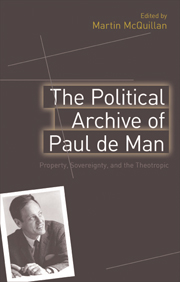Book contents
- Frontmatter
- Contents
- List of Abbreviations
- Acknowledgements
- Notes on Contributors
- Introduction: Broken Promises: Rousseau, de Man and Watergate
- 1 Lovence in Rousseau's Julie ou la Nouvelle Héloïse
- 2 Reading Spectacles in Rousseau's Letter to d'Alembert
- 3 The Utter Misery of the Human Mind: Apotropaic and Theotropic in de Man's Rousseau
- 4 Rhetoric and Rausch: de Man on Nietzsche on Value and Style
- 5 Theotropic Logology: J. Hillis Miller, Paul de Man and Kenneth Burke
- 6 Normativity, Materiality and Inequality: The Politics of the Letter in Paul de Man
- 7 Inscribing the Political: Paul de Man and the Wild Art of Letter Writing
- 8 Mistake in Paul de Man: Violent Reading and Theotropic Violence
- 9 Lightstruck: ‘Hegel on the Sublime’
- 10 De Man vs. ‘Deconstruction’: or, Who, Today, Speaks for the Anthropocene?
- 11 Paul de Man at Work: What Good is an Archive?
- 12 DNA: de Man's Nucleic Archive
- 13 Sovereign Debt Crisis: Paul de Man and the Privatization of Thought
- Appendix: Nietzsche I: Rhetoric + Metaphysics
- Index
7 - Inscribing the Political: Paul de Man and the Wild Art of Letter Writing
Published online by Cambridge University Press: 05 August 2013
- Frontmatter
- Contents
- List of Abbreviations
- Acknowledgements
- Notes on Contributors
- Introduction: Broken Promises: Rousseau, de Man and Watergate
- 1 Lovence in Rousseau's Julie ou la Nouvelle Héloïse
- 2 Reading Spectacles in Rousseau's Letter to d'Alembert
- 3 The Utter Misery of the Human Mind: Apotropaic and Theotropic in de Man's Rousseau
- 4 Rhetoric and Rausch: de Man on Nietzsche on Value and Style
- 5 Theotropic Logology: J. Hillis Miller, Paul de Man and Kenneth Burke
- 6 Normativity, Materiality and Inequality: The Politics of the Letter in Paul de Man
- 7 Inscribing the Political: Paul de Man and the Wild Art of Letter Writing
- 8 Mistake in Paul de Man: Violent Reading and Theotropic Violence
- 9 Lightstruck: ‘Hegel on the Sublime’
- 10 De Man vs. ‘Deconstruction’: or, Who, Today, Speaks for the Anthropocene?
- 11 Paul de Man at Work: What Good is an Archive?
- 12 DNA: de Man's Nucleic Archive
- 13 Sovereign Debt Crisis: Paul de Man and the Privatization of Thought
- Appendix: Nietzsche I: Rhetoric + Metaphysics
- Index
Summary
It ought to be clear by now that Paul de Man's work is neither ahistorical nor apolitical, though it is even more evident that his writing is both historical and political in a sense that is not always easy to identify much less interpret. The problem has to do with the way de Man conceives of genuine historical and political activity as becoming accessible only on the far side of critical-linguistic analyses that are themselves made possible by protocols simultaneously literary and philosophical in nature. Hence the reference in de Man's late writings to ideology. Ideology would be the self-defeating attempt to reach historical and political realities by by-passing or forgetting the obligation to account for the rhetorical and epistemological elements of which it too is necessarily composed. In other words, as de Man famously says in ‘The Resistance to Theory’, what we call ideology is the confusion of reference with phenomenalism. Reference, without which no history or politics worthy of the names would ever be conceivable, depends on both a hermeneutics, which pertains to a determination of the meaning ensuing from referential statements, and a poetics, which pertains to the devices by which alone meaningful reference can be achieved. ‘Phenomenalism’ names the illusory postulation of a historical and political reality so immediate as to be somehow free of the linguistic complications that attend upon any and all referentiality. The actual move to history and politics, then, implies nothing more nor less than that: a passage that always occurs by articulating thought with action, though only by also shouldering the burden imposed by its own unavoidable mediation through the properly linguistic orders of reality.
- Type
- Chapter
- Information
- The Political Archive of Paul de ManProperty, Sovereignty and the Theotropic, pp. 91 - 102Publisher: Edinburgh University PressPrint publication year: 2012



